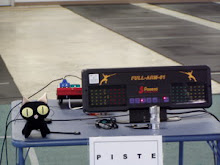The United States Fencing Association(USFA)named the US fencing team late Saturday afternoon.
Several members are returning Olympic athletes; others are new to the games.
2004 Gold Medalist Mariel Zagunis and Olympic Veteran Keeth Smart will lead the US Women's and Men's Sabre teams at the 2008 Olympic Games. The United States qualified three teams for Olympic competition - Women's Sabre, Men's Sabre, and Women's Foil. Bronze medalist Sada Jacobson and Rebecca Ward will join Zagunis on the women's saber team. Dagmara Wozniak is the alternate and can be called in as a substitute during the team event.
I'm sure we're going to have a great Olympic competition; our women's sabre team is one of the best in the world, and some of our individual fencers are quite good as well.
I can't wait to hear about the results of the games! Unfortunately, most fencing does not get broadcast on television. Well, not on any channels that I get, anyway, so I'll consider myself lucky if I only get to see the gold medal bout. Particularly if our women's sabre team goes as far as I think they will.


